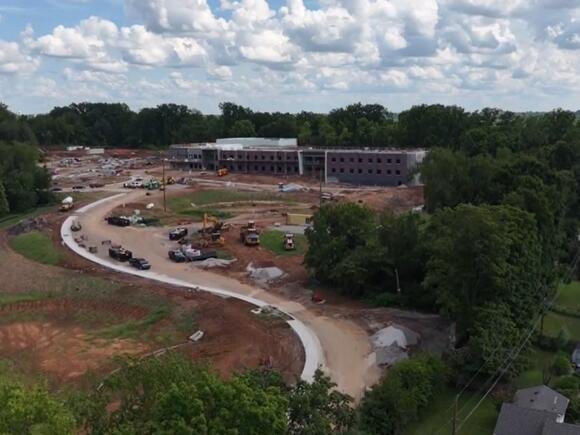In the quiet suburbs of Lexington, Kentucky, where manicured lawns meet quiet streets, the promise of educational progress has clashed with the sanctity of private property. Fayette County Public Schools (FCPS), the state’s sixth-largest district, is building Rise STEM Academy for Girls—a 900-student facility on a 35-acre site at the corner of Mason Headley and Versailles Roads. Acquired for $10.1 million in 2022, the project aims to foster STEM education for underserved girls. Yet, by August 2025, this vision has sparked a fierce legal showdown, as four homeowners sue the school board over eminent domain proceedings. What began as construction noise has escalated into accusations of trespassing, poor faith negotiations, and constitutional overreach, pitting community roots against public needs.
The Project’s Footprint: From Acquisition to Expansion

Rise STEM Academy broke ground in early 2024, transforming a former private estate into a modern campus with specialized labs and collaborative spaces. The site’s driveway, once serving the Webb family, became a flashpoint. Homeowners along Fair Oaks Drive and Port Royal Drive—properties abutting the 35 acres—noticed heavy equipment encroaching on their land as early as March 2024. Construction crews used the driveway for access, allegedly without a recorded easement, leading to cracked retaining walls, disrupted landscaping, and fears of flooding.
FCPS maintains the expansion is essential for safe bus lanes and drop-off zones, accommodating up to 50 daily buses. “While eminent domain is a measure of last resort, it is sometimes necessary to meet the long-term needs of our students and community,” the district stated in an August 4, 2025, press release. The targeted parcel totals 0.1759 acres—slivers of backyards from four homes—to widen the access road off Versailles Road.
Failed Talks and Trespass Claims: The Path to Litigation
Homeowners Theresa Leito, Kris Zander, and two neighbors initiated contact with FCPS in July 2024, seeking clarity on boundary lines and protections. Responses were vague or absent, they claim, despite cease-and-desist letters sent in October 2024. Leito, whose property borders the site, described watching “a lot of things happen back here” since March, including damage to a wall inches from her home. Zander echoed the frustration: “Very confused to just read in the news that the board had voted to use eminent domain… and we had no idea that was happening.”
After months of stalled negotiations—where FCPS offered assessed values ranging from $5,000 to $15,000 per parcel, rejected as inadequate—the board voted unanimously on August 4, 2025, to condemn the land. Construction resumed days later, prompting the lawsuit filed August 7, 2025, in Fayette Circuit Court (Case No. unspecified in public records). Represented by development attorney Bruce Simpson, the suit names individual board members, alleging trespass since 2022 and violations of Kentucky Revised Statutes Chapter 416 on eminent domain.
Key Allegations:
- Unconstitutional taking without just compensation or due process
- Trespass and property damage without easement
- Failure to engage in good-faith negotiations or provide formal notice
- Ignoring alternative access routes on the district’s vacant land
The complaint argues the board’s actions burden families unnecessarily, eroding property values and quality of life. “The School Board has plenty of vacant land on which it can construct access… without unfairly impermissibly burdening the lives of these citizens,” it states.
The District’s Defense: Public Necessity Over Private Slivers
FCPS frames the action as a reluctant but required step for student safety. Chief Operating Officer Myron Thompson explained the bus lanes prevent congestion on Versailles Road, a busy artery. The district insists it followed legal protocols, including appraisals and offers, and will compensate owners at fair market value—potentially higher than assessed if contested in court.
In a statement, FCPS emphasized: “The district has engaged in good-faith negotiations… and will continue to work within all legal requirements.” Critics, including Simpson, counter that resuming work post-vote was an “egregious violation,” especially amid unanswered meeting requests. As of November 2025, the board has not publicly responded to the suit, though it vows to defend the project.
Courtroom Crossroads: Seeking Injunctions and Accountability
The lawsuit demands an injunction halting construction on private land, full compensation for damages (including emotional distress), and a mandated board-homeowner meeting. It invokes the Fifth Amendment’s Takings Clause, applied via the Fourteenth, requiring “public use” and “just compensation.” Kentucky law mandates 90-day notice before condemnation, which plaintiffs say was skipped.
Judicial milestones remain pending: No hearings are scheduled as of mid-November 2025, but discovery could reveal internal emails on alternatives. Similar cases, like Kelo v. City of New London (2005), upheld broad eminent domain for public benefit, but homeowners here leverage trespass claims for leverage. Flooding concerns escalated in October 2025, with neighbor Rebecca White reporting basement inundation from site runoff—unrelated to the suit but amplifying grievances.
The financial stakes? Legal fees could top $100,000, with potential jury awards for severance damages (lost property value) exceeding offers. Over 53% of local Reddit users in r/lexington sympathize with homeowners, decrying the board as “out of control.”
Broader Echoes: Eminent Domain’s Shadow in Education
This dispute spotlights eminent domain’s double edge: empowering infrastructure while displacing families. In Kentucky, schools have invoked it sparingly—last major case in 2018 for a Jefferson County expansion—but national trends show rising challenges post-Kelo. The U.S. Supreme Court affirmed compensation suffices, yet states like Kentucky require “strict necessity.”
For FCPS, already navigating enrollment growth (from 41,000 to 42,500 students since 2020), the suit risks delays to the academy’s 2026 opening. Homeowners, meanwhile, face uprooted lives: Leito laments, “They’re ruining my life, I have to start over.”
Pathways Forward: Mediation or Mandamus?
As November 2025 unfolds, mediation looms—Kentucky courts favor it for eminent domain. If unresolved, a trial could set precedents on school access rights. Best practices for districts? Early surveys, transparent talks, and impact studies. For owners: Document damages, consult appraisers.
Ultimately, Rise STEM’s promise collides with property’s permanence. In Lexington’s backyards, the fight isn’t just for land—it’s for the unyielding belief that home is where the heart, and the fence line, endures.

